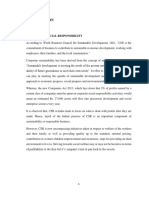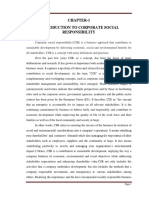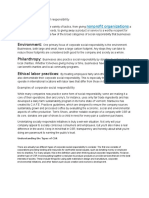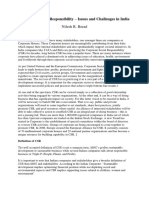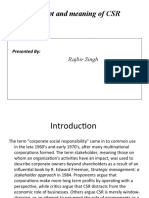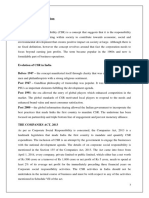CSR in India-Initiatives by Some Indian Companies
CSR in India-Initiatives by Some Indian Companies
Uploaded by
shantanu_malviya_1Copyright:
Available Formats
CSR in India-Initiatives by Some Indian Companies
CSR in India-Initiatives by Some Indian Companies
Uploaded by
shantanu_malviya_1Original Description:
Original Title
Copyright
Available Formats
Share this document
Did you find this document useful?
Is this content inappropriate?
Copyright:
Available Formats
CSR in India-Initiatives by Some Indian Companies
CSR in India-Initiatives by Some Indian Companies
Uploaded by
shantanu_malviya_1Copyright:
Available Formats
CSR IN INDIA-INITIATIVES BY SOME INDIAN COMPANIES
Saturday, 07 January 2012 09:53 Prof. (Dr.) Rajni Rastogi Prof and Head of the Management Department Sitapur Group of Insti
CSR IN INDIA-INITIATIVES BY SOME INDIAN COMPANIES
Venumohan Gupta Associate Professor, Motilal Rastogi School of Management Lucknow
Abstract
Corporate Social Responsibility is on the rise all over the world and in India also. Over the past decades a growing number of companies have recognized the business benefits of CSR policies and practices.. Civil Societies, consumers and other actors have increased pressure on companies to adhere to social and environmental standards and this pressure has impact on the business in India. Key WordsSocial and Environmental Standards. Business benefits of CSR, CSR -philosophy,CSR -Initiatives
CSR-An Overview The ideas of CSR can be discerned from the three words contained within its title phrase: Corporate' ,'Social' and 'Responsibility. Therefore in a broader senses CSR covers the responsibilities corporations have towards society within which they are based and operate, not denying the fact that the purview of CSR goes much beyond this. Over the past decades a growing number of companies have recognized the business benefits of CSR policies and practices. Their experiences have been bolstered by a growing body of empirical studies which demonstrate that CSR has a positive impact on business Economic performance and it is not harmful to shareholder value. Companies have also been encouraged to adopt and/or expand CSR efforts as a result of pressures from Customers, suppliers, Employees, Communities, investors, activist, organization, and other stakeholders. Relevance of CSR today CSR as a strategy is becoming increasingly important for businesses today because of these identifiable trends.
1. Changing Social Expectations Consumers and society in general expect more from the companies whose products they buy. This sense has increased in the light of recent corporate scandals, which reduced public trust of corporations, and reduced public confidence in the ability of regulatory bodies and organizations to control corporate excess.
2. Increasing Affluence This is true within developed nations, but also in comparison to devel oping nations society in need of work and inward investment is less likely to enforce strict regulations and penalize organizations that might take their business and money elsewhere.
Benefits of CSR
1. Improved Financial Performance An recent study has found that Stake holder balanced companies showed four times the growth rate and eight times employment growth ,when compared to companies that focused only on shareholders and profit maximization.
2. Enhanced Brand Image and Reputation A company considered socially responsible can benefit both by its enhanced Reputation with the Public as well its reputation within the business.
3. Increased sales and customer loyalty. A number of studies have suggested a large and growing market for the products and services of companies to be socially responsible.
4. Increased ability to attract and retain employees. Companies perceived to have strong CSr commitments often found it easier to recruit employees particularly in tight labour markets. Retention levels are higher too.
5. Reduced Regulatory oversight Companies that demonstrate that they are engaging in practices that satisfy and go beyond regulatory compliance requirements are given less scrutiny and more free reign by both National and Local Government Entities.
6. Easier access to Capital It is clear that companies addressing ethical, social and environmental responsibilities have rapidly growing access to capital that might not otherwise have been available.
CSR in India Corporate Social Responsibility is on the rise all over the world and in India also. Civil Societies, consumers and other actors have increased pressure on companies to adhere to social and environmental standards and this pressure has impact on the business in India.
Limits of regulatory initiatives, changing nature of judicial activism, governments greater relevance on private enterprises etc. places greater responsibility on voluntary approaches as an alternative means of building social rights.
Observations from Full O Dreamz CSR Rating of India's 500 largest companies:
Most companies are not doing any CSR. Many companies are only making token gestures towards CSR in tangential ways such as donations to charitable trusts or NGOs, sponsorship of events, etc. Most companies believe that charity and philanthropy equals to CSR; very few companies are using their core competence to benefit the community. Most companies use CSR as a marketing tool to further spread the word about their business. For instance, donation of a token amount to some cause on purchase of a particular product. The fact that companies are hiring advertising agencies for their CSR further highlights this.
Only Few Indian companies (from this study) publish a Corporate Sustainability Report to measure and assess the impact of their business on the environment.
Very few companies openly state the processes followed by them, the damage caused by these processes, and the steps taken to minimize this damage. Very few companies state how much they spend on CSR. There is no mention of the amount spent in any of their balance sheets or annual reports. Most companies just list and describe their CSR activities and seem to be spending minimal amounts on CSR. Very few companies are engaged in CSR activities in the local communities where they are based. Very few companies have a clearly defined CSR philosophy. Most implement their CSR in an ad-hoc manner, unconnected with their business process. Most companies spread their CSR funds thinly across many activities, thus somewhere losing the purpose of undertaking that activity. Most companies appear reluctant to themselves fulfill their CSR unless it is mandatory by law. Generally speaking, most companies seem either unaware or dont care about CS R. However, all companies can be considered to be an upward learning curve with respect to CSR and it is expected that the situation will improve.
Initiatives
in
some
Indian
Companies
ACC Limited -CSR Activities ACC has undertaken social volunteering practices almost from its inception, long before the term corporate social responsibility was coined. The companys earliest initiatives in community development date back to the 1940's in a village on the outskirts of Mumbai while the first formal Village Welfare Scheme was launched in 1952. The community living around many of our factories comprises the weakest sections of rural and tribal India with no access to basic amenities.
Corporate Social Responsibility Policy The Company shall continue to have among its objectives the promotion and growth of the national economy through increased productivity, effective utilization of material and manpower resources and continued application of modern scientific and managerial techniques, in keeping with the national aspiration; and the Company shall continue to be mindful of its social and moral responsibilities to consumers, employees, shareholders, society and the local community.
Community & Rural Welfare ACC community development activities revolve around the under-privileged community that lives in the immediate vicinity of our cement plants and is thus more dependent on us. The range of our activities begins with extending educational and medical facilities and goes on to cover vocational guidance and supporting employment-oriented and income-generation projects like agriculture, animal husbandry, cottage industries by developing local skills, using local raw materials and helping create marketing outlets.
At all our cement factories we share our amenities and facilities with members of the local community. This includes sharing education and medical facilities, sports and recreation. Wherever possible we share access to Bore Wells, drinking water and the usage of colony roads.
Education Education is imparted not only to children of ACC employees but also more importantly to children from rural areas who do not have access to any medium of information or education. ACC schools maintain high standards and are open to other children of the vicinity. Often these schools are the most preferred centers of learning in the district and adjoining areas. Wherever possible, ACC provides funds and infrastructure to help set up local schools, colleges and centers for learning and education.
Healthcare ACC takes pride in providing various forms of medical assistance to the families of our employees and also to all those living in surrounding villages. Each factory has a medical center with full-fledged doctors and the latest of basic equipment. Mobile medical services are provided in the vicinity and regular medical camps are held to eradicate diseases, offers medical help, treatment and preventive care.
ACC has come out to provide support to the State and National health initiatives such as the eradication of malaria, dengue fever and the dreaded HIV.
Hindustan Latex Limited - CSR Activities Hindustan Latex Limited, a public sector company established more than three decades ago, came to occupy a premier position in the countrys family planning and health care programs. The company not only established itself as the leader in the segment of manufacture of contraceptives, but also diversified into manufacturing and marketing of other related health care products . Social marketing became one of the key areas of the company to ensure that quality contraceptives are available to the people at an affordable price at an arms length of desire.
Though the direct marketing operations of the company were doing very well, over the years, the company realized that its social obligation being paramount, the company could not look at profitability alone, which was however being sustained through its exports and direct marketing. The company realized the need for family planning and healthcare programs aimed at the poor and disadvantaged sections of the society. Hindustan Latex Limited thus ventured into social sector projects aimed at creating a planned social change. It was with this objective that HLL formed the Hindustan Latex Family Planning Promotion Trust, a non-profit organization promoted by HLL.
Since its establishment in 1992, HLFPPT has been undertaking the conceptualization and implementation of various Social Sector Projects. The Trusts area of operations extends to the various states of India. Although the Trust was established for promoting the agenda of family planning, the Trusts activities have now been broad based to focus on reproductive and sexual health. The T rust is expected to develop into a major civil society participant working in the health sector, in partnership with a range of development actors.
Kanoria Chemicals Industries Limited Kanoria Chemicals Industries Limited is a major player in the Indian Chemical Industry, generating a sales turnover of about US$ 70million. The company's history dates back to 1962, starting its operations in Renukoot ( the eastern region of India) as a single product company. At present, KCIL has transformed itself into a multi-product, multi-location group and has established itself as a pioneer in its field. Working on the philosophy of 'Pioneering growth through technology' every single plant at KCIL has been set up with the best technology the world has to offer. Without compromising the core values of business ethics, the group has achieved impressive value additions resulting from the strategy of forward and backward integration in its manufacturing operations.
The company is involved in various community development initiatives and has adopted villages around their plants for development activities. The focus areas are community services which include social development schemes like educational activities, medical programmes and cultural activities. Agricultural and environmental activities which include tree plantation drives and water resource programmes, self employment schemes which include training programmes for various income generation activities like tailoring, basket making, wax farming etc.
The company has built a nationally recognised school and an in-house hospital that caters to the educational and health needs of the local community in which it operates. The company has also planted around 2.75 lakh trees in its premises reiterating the company's commitment towards environment.
HEG Limited - Environmental & Social Initiatives Ecological impact: The Company is completely conscious of the environmental impact its operations and actions can have on its surroundings. To counter this effect, HEG has in place efficient systems to reduce any undesirable fallout from its processes. HEG is an ISO-14001 certified company since June 2005. The Company has taken up the responsibility to further improve the ecological conditions around its facilities, by implementing a widespread forestation programme. HEG's Mandideep manufacturing complex is testimony to how serious the Company is towards improving the environment
around its facilities. The Mandideep facility is considered one of the cleanest graphite electrode plants in the world, when seen in the light of the materials used and the products manufactured in the graphite plant.
The Company also believes in recycling and reusing any byproducts from its manufacturing processes. The Waste Heat Recovery System (WHRS) power plant is a fine example of this fact, as it makes productive use of the heat generated by waste gases that are released during the manufacture of sponge iron.
Community Outreach HEG believes that local communities have a vital role to play in creation of wealth and to develop local society. HEG has various programmes to better their standard of living. To encourage education and the general welfare of people in Mandideep and its surroundings, a non-profit body Graphite Education & Welfare Society, was established in 1981. The Company operates a Graphite Primary School in HEG, Mandieep. HEG and its employees regularly come together to conduct medical camps, socio-cultural activities and other community work, often in partnership with local authorities and NGOs undertaking several CSR activities on a significant scale since its establishment in 1991.
The Foundation works with the deprived sections of society wherever the Group starts business operations. It focuses on four specific areas: Education; Health, Hygiene and Sanitation; Empowerment & Livelihoods and Community Based Programme.
Today the Foundation activities span the length and breadth of the country with ongoing initiatives in Rajam, Rajamundry, Chennai, Hyderabad, Delhi, Mangalore, Uttaranchal, Bangalore.
References1. 2. 3. 4. 5. 6. 7. 8. 9 10 Business Ethics-P.K. Ghosh p33-36 -2010 Vrinda Publications (P) Ltd. Corporate that care(CSR)International Journal of management Science Vol-2,July 2006 pp88 Business Ethics- Prof. Ravindra Nath V. Badi, Prof. Narayansa. V. Badi- Vrinda Publications (P)Ltd.2006 pp53-54 http//www.worldbank.org/poverty/scapital/sources/comm1.html www.csrwire.com www.wbcsd.org www.globalreporting.org World Bank2002 Social Capital and Community http//www.worldbank.org/poverty/scapital/sources/comm1.html http//nre.concordia.ca/OAC/SRPD/municipal.html
You might also like
- Hotel Invoice TemplateDocument1 pageHotel Invoice Templateayah duaNo ratings yet
- Kansas City Zephyrs Baseball ClubDocument3 pagesKansas City Zephyrs Baseball Clubbinzidd007100% (1)
- Captain America TFA Auction Catalog PDFDocument104 pagesCaptain America TFA Auction Catalog PDFlokatastrophe100% (2)
- Communicating For Results 3rd EdDocument568 pagesCommunicating For Results 3rd EdSamJacobs79% (19)
- BS 6001-3-1993 - (2017-10-06 - 02-55-05 Am)Document22 pagesBS 6001-3-1993 - (2017-10-06 - 02-55-05 Am)Rankie ChoiNo ratings yet
- Corporate Social ResponsibilityDocument7 pagesCorporate Social ResponsibilitySri KanthNo ratings yet
- Corporate Social ResponsibilityDocument22 pagesCorporate Social ResponsibilityChirag JainNo ratings yet
- Social Management ProjectDocument33 pagesSocial Management ProjectTejasNo ratings yet
- CSR in Corporate IndiaDocument9 pagesCSR in Corporate Indiaajit dasNo ratings yet
- CSR Activity 2024 NTPCDocument12 pagesCSR Activity 2024 NTPCinvestorspointssNo ratings yet
- Operating CostsDocument2 pagesOperating CostsmehedihsnNo ratings yet
- CSR UNDER COVID byDocument15 pagesCSR UNDER COVID byinvestorspointssNo ratings yet
- KushanDocument8 pagesKushanKushan Sudan100% (1)
- SM - CSRDocument29 pagesSM - CSRKakali ChatterjeeNo ratings yet
- Corporate Social Responsibility (CSR)Document9 pagesCorporate Social Responsibility (CSR)Neha ChoudharyNo ratings yet
- Swot & CSRDocument4 pagesSwot & CSRdilwindersinghse21a1413No ratings yet
- Corporate Social ResponsibilityDocument9 pagesCorporate Social ResponsibilityPrabhjot SinghNo ratings yet
- Corporate Social ResponsibilityDocument2 pagesCorporate Social ResponsibilityVarsha ChhabriyaNo ratings yet
- "A Study of Corporate Social Responsibility "At Tata Support Services PVT LTD" Chapter No 1Document4 pages"A Study of Corporate Social Responsibility "At Tata Support Services PVT LTD" Chapter No 1Shaikh SohaibNo ratings yet
- SOCIAL RESPONSIBILITY OF BHARAT PETROLEUM CORPORATION LIMITED (BPCL) Cutive SummaryDocument35 pagesSOCIAL RESPONSIBILITY OF BHARAT PETROLEUM CORPORATION LIMITED (BPCL) Cutive SummaryManish DiwaleNo ratings yet
- Chapter-1 Introduction To Corporate Social ResponsibilityDocument5 pagesChapter-1 Introduction To Corporate Social Responsibilityreethu kunaNo ratings yet
- Document CSR ActivityDocument9 pagesDocument CSR ActivityVinayak PadaveNo ratings yet
- CSR Activities of Coca ColaDocument19 pagesCSR Activities of Coca ColaAjay Raj Singh94% (16)
- CSR Research PaperDocument10 pagesCSR Research PaperEman Arshad AliNo ratings yet
- Corporate Social ResponsibilityDocument7 pagesCorporate Social Responsibilityaamod_joshiNo ratings yet
- Name: Awais Farooq Roll No.: 28 Course: Introduction To Business Teacher: Prof. Fida Hussain Bukhari Topic: CSRDocument12 pagesName: Awais Farooq Roll No.: 28 Course: Introduction To Business Teacher: Prof. Fida Hussain Bukhari Topic: CSRroyawaisNo ratings yet
- Corporate Social Responsibility (CSR) : Utkarsh Aryan 20BBA005Document15 pagesCorporate Social Responsibility (CSR) : Utkarsh Aryan 20BBA005Utkarsh AryanNo ratings yet
- Corporate Social Responsibility (CSR) : Utkarsh Aryan 20BBA005 BBA (6 Sem)Document15 pagesCorporate Social Responsibility (CSR) : Utkarsh Aryan 20BBA005 BBA (6 Sem)Utkarsh AryanNo ratings yet
- CSR EssayDocument6 pagesCSR EssayShreyaNo ratings yet
- Types of Corporate Social ResponsibilityDocument10 pagesTypes of Corporate Social Responsibilityrinky_trivedi100% (1)
- Corporate Social ResponsibilityDocument24 pagesCorporate Social ResponsibilityJose Lester Correa DuriaNo ratings yet
- CSR-An Overview: Relevance of CSR TodayDocument9 pagesCSR-An Overview: Relevance of CSR TodayHarpreet MaviNo ratings yet
- Corporate Social ResponsibilityDocument41 pagesCorporate Social ResponsibilityDiana Vergara MacalindongNo ratings yet
- Final CSR Report KartikDocument38 pagesFinal CSR Report KartikMohammed SalmanNo ratings yet
- CSR Mini ReportDocument18 pagesCSR Mini ReportShantanu KuilaNo ratings yet
- CSR PracticesDocument17 pagesCSR PracticesIflah ImtiyazNo ratings yet
- BEthics ReportsDocument9 pagesBEthics ReportsMaleni JayasankarNo ratings yet
- Corporate Social Resposibilty (CSR)Document41 pagesCorporate Social Resposibilty (CSR)khairnar_chetan3014No ratings yet
- Ihrm Corporate Social ResponsibilityDocument4 pagesIhrm Corporate Social Responsibilityamrit0% (1)
- Corporate Social ResponsibilityDocument8 pagesCorporate Social ResponsibilityJaganya BabuNo ratings yet
- Anisha SynopsisDocument38 pagesAnisha SynopsisVishwas SharmaNo ratings yet
- Corporate Social Responsibility-Issues and Challenges in IndiaDocument12 pagesCorporate Social Responsibility-Issues and Challenges in IndiaKhateeb Ullah ChoudharyNo ratings yet
- Presented By: Piyush Kumar Mba Ii SemDocument20 pagesPresented By: Piyush Kumar Mba Ii Semdj_livewireNo ratings yet
- It Elect 5 ReviewerDocument6 pagesIt Elect 5 ReviewerDionne Sebastian DoromalNo ratings yet
- Concept and Meaning of CSR: Rajbir SinghDocument28 pagesConcept and Meaning of CSR: Rajbir SinghChinar JoshiNo ratings yet
- CSRDocument10 pagesCSRDr.Rashmi GuptaNo ratings yet
- Ijbgm - Corporate Social Responsibility A Contribution by Indian Banks - Puneet KaurDocument18 pagesIjbgm - Corporate Social Responsibility A Contribution by Indian Banks - Puneet Kauriaset123No ratings yet
- Corporate Social Resp1Document21 pagesCorporate Social Resp1ashwini_thorve91100% (1)
- CSR AssignmentDocument10 pagesCSR AssignmentMukesh ManwaniNo ratings yet
- Corporate Social ResponsibilityDocument6 pagesCorporate Social ResponsibilityVinayak ShindeNo ratings yet
- Assignment Report (2) : Title-Corporate Social ResponsibilityDocument17 pagesAssignment Report (2) : Title-Corporate Social ResponsibilitykanikaNo ratings yet
- SMDocument15 pagesSMneha100% (1)
- Corporate Social ResponsibilityDocument22 pagesCorporate Social Responsibilityashank7No ratings yet
- Dissertation On CSR in IndiaDocument4 pagesDissertation On CSR in IndiaCheapPaperWritingServicesSingapore100% (1)
- Media 8Document3 pagesMedia 8rajsajjanNo ratings yet
- Marketing ManagementDocument16 pagesMarketing ManagementShilu MNo ratings yet
- 1-2 (Business Ethics and Social Responsibility in Business) (Business and The Law) NEAN and LARADocument34 pages1-2 (Business Ethics and Social Responsibility in Business) (Business and The Law) NEAN and LARALea Jane HubahibNo ratings yet
- Ilide - Info Tata Group CSR PR - RemovedDocument25 pagesIlide - Info Tata Group CSR PR - Removedsubhajitmitra999No ratings yet
- CSR ItcDocument16 pagesCSR Itcatul8860491212No ratings yet
- CSR As A Tool Sales PromotionDocument7 pagesCSR As A Tool Sales PromotionNabuweya NoordienNo ratings yet
- Entrepreneurial Leadership and Financial Stability in Nonprofit Organizations: A New Assessment of Social Entrepreneurship and the Social EnterpriseFrom EverandEntrepreneurial Leadership and Financial Stability in Nonprofit Organizations: A New Assessment of Social Entrepreneurship and the Social EnterpriseNo ratings yet
- CRM Course Manual - NewDocument21 pagesCRM Course Manual - Newshantanu_malviya_1No ratings yet
- Project EmployeeDocument30 pagesProject Employeeshantanu_malviya_1No ratings yet
- Practical QuestionsDocument6 pagesPractical Questionsshantanu_malviya_1100% (1)
- Employees Work On A Construction Site in Manila. AFP FILE PHOTODocument4 pagesEmployees Work On A Construction Site in Manila. AFP FILE PHOTOshantanu_malviya_1No ratings yet
- Tata Case SolutionDocument10 pagesTata Case Solutionshantanu_malviya_1100% (1)
- BHARATCRAFTDocument11 pagesBHARATCRAFTshantanu_malviya_1No ratings yet
- Equtiy Research ProjectDocument33 pagesEqutiy Research Projectshantanu_malviya_1No ratings yet
- Retrospective Tax by Financial Bill 2012: Iilm Institute For Higher Eduction, GurgaonDocument8 pagesRetrospective Tax by Financial Bill 2012: Iilm Institute For Higher Eduction, Gurgaonshantanu_malviya_1No ratings yet
- GmeDocument5 pagesGmeshantanu_malviya_1No ratings yet
- Anuj ResumeDocument3 pagesAnuj Resumeshantanu_malviya_1No ratings yet
- Presentation On JD For Operation Profile: Aasif Alapati Sriram Akshat Mehta Anjini Reddy Kumari Shanta Presented byDocument9 pagesPresentation On JD For Operation Profile: Aasif Alapati Sriram Akshat Mehta Anjini Reddy Kumari Shanta Presented byshantanu_malviya_1No ratings yet
- Cover LetterDocument1 pageCover Lettershantanu_malviya_1No ratings yet
- AquacultureDocument15 pagesAquacultureshantanu_malviya_1No ratings yet
- Real World NegotiationDocument4 pagesReal World Negotiationshantanu_malviya_1No ratings yet
- Sports Bar Plan @Document18 pagesSports Bar Plan @shantanu_malviya_1100% (1)
- Business Plan QuestionnaireDocument4 pagesBusiness Plan Questionnaireshantanu_malviya_1No ratings yet
- Five Prize-Winning Economic Theories: 1. Management of Common Pool ResourcesDocument4 pagesFive Prize-Winning Economic Theories: 1. Management of Common Pool Resourcesshantanu_malviya_1No ratings yet
- Cover LetterDocument1 pageCover Lettershantanu_malviya_1No ratings yet
- Windows SystemDocument7 pagesWindows Systemshantanu_malviya_1No ratings yet
- CSR in India-Initiatives by Some Indian CompaniesDocument5 pagesCSR in India-Initiatives by Some Indian Companiesshantanu_malviya_1No ratings yet
- Analysis of Tele Calling Report: Guna, Shivpuri & Tikamgarh DistrictDocument16 pagesAnalysis of Tele Calling Report: Guna, Shivpuri & Tikamgarh Districtshantanu_malviya_1No ratings yet
- Afb Project Data Set No:3Document4 pagesAfb Project Data Set No:3shantanu_malviya_1No ratings yet
- Davey Brothers in Class WorkingDocument13 pagesDavey Brothers in Class WorkingPiyush KumarNo ratings yet
- Salam Financing Question 11.5Document2 pagesSalam Financing Question 11.5cik bungaNo ratings yet
- Babson Campus Map WellesleyDocument2 pagesBabson Campus Map WellesleyJefferson FAONo ratings yet
- Sula WinesDocument15 pagesSula WinesAnirvaan GhoshNo ratings yet
- Cost DJB - ICAI Mat AdditionalDocument32 pagesCost DJB - ICAI Mat AdditionalMayuri KolheNo ratings yet
- RA 8187 or Paternity Leave ActDocument2 pagesRA 8187 or Paternity Leave Actdaryll100% (1)
- Project ReportDocument110 pagesProject ReportShubham Soni100% (1)
- Anil Gautam, Adv. Ajay Pal 18.10.2006Document6 pagesAnil Gautam, Adv. Ajay Pal 18.10.2006Ravinder bishtNo ratings yet
- Challenges of Product DevelopmentDocument16 pagesChallenges of Product Developmentrip111176No ratings yet
- Sample Istqb QuestDocument39 pagesSample Istqb QuestViji Kathir100% (1)
- SkripDocument2 pagesSkripSyazilla AzallanNo ratings yet
- Athulya - First Phase ReportDocument4 pagesAthulya - First Phase Reportkanish_georgeNo ratings yet
- Career Objective: Senior Production EngineerDocument4 pagesCareer Objective: Senior Production Engineeramol thengNo ratings yet
- ILO Convention No. 155 Occupational Safety and Health Convention, 1981Document9 pagesILO Convention No. 155 Occupational Safety and Health Convention, 1981Salman ShahzadNo ratings yet
- Sales Tax: Calculation of Sales Tax Double Entries Ledger Accounts of Sales Tax Practice Questions Answer BankDocument10 pagesSales Tax: Calculation of Sales Tax Double Entries Ledger Accounts of Sales Tax Practice Questions Answer BankUmar Sageer100% (1)
- Flora ParadeDocument4 pagesFlora ParadeNur SabrinaNo ratings yet
- Website Small Business ListDocument20 pagesWebsite Small Business ListKeshwa MurthyNo ratings yet
- Developments in Corporate Governance: Udo C. Braendle, Alexander N. KostyukDocument11 pagesDevelopments in Corporate Governance: Udo C. Braendle, Alexander N. KostyukArvin Loveenash RockNo ratings yet
- Atlas Copco Air Compressor Parts CatalogDocument591 pagesAtlas Copco Air Compressor Parts CatalogYacine CherifiNo ratings yet
- Communication Management in Project Management PDFDocument2 pagesCommunication Management in Project Management PDFMelodyNo ratings yet
- Master Production ScheduleDocument5 pagesMaster Production ScheduleSohel JatuNo ratings yet
- Business Communication in An MNC in BD, UnileverDocument20 pagesBusiness Communication in An MNC in BD, UnileverAbdullah Al Mahmud33% (3)
- Sales Force Recruitment Planning and Selection ProcessDocument22 pagesSales Force Recruitment Planning and Selection ProcessCharu Modi0% (1)
- Division Clearance (Annual Clearance For School Heads) : Certified by The Authorized OfficialsDocument1 pageDivision Clearance (Annual Clearance For School Heads) : Certified by The Authorized OfficialsAnjHerreraNo ratings yet
- Resume Kevin SeifertDocument3 pagesResume Kevin Seifertapi-299480880No ratings yet








